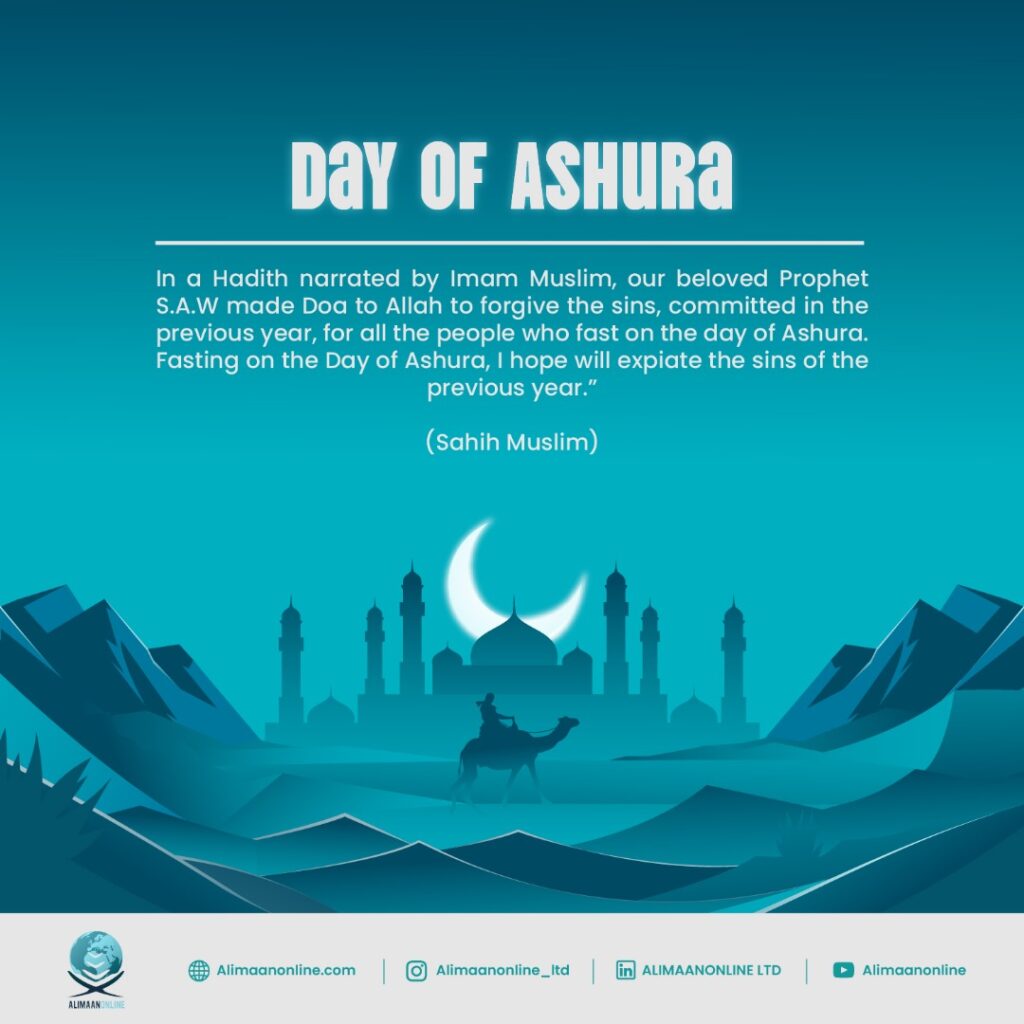The Day of Ashura, observed on the 10th day of Muharram in the Islamic calendar, holds great significance for Muslims worldwide. This day commemorates various historical events, including the Battle of Karbala, the story of Musa (Moses), and the survival of Prophet Noah’s Ark. Understanding what is the Day of Ashura and its history and significance helps in appreciating its importance in the Islamic tradition. Additionally, fasting on the Day of Ashura, along with the 9th and 11th of Muharram, has deep-rooted religious implications, reflecting the practices of Prophet Muhammad (PBUH) and other prophets.
What is the Day of Ashura?
The Day of Ashura is a sacred day in Islam, marking significant events in Islamic history. Certain days in the year hold more virtue than others, and one such day is the 10th of Muharram, known as the Day of Ashura, in the first month of the Islamic lunar calendar. The term “Ashura” comes from the Arabic word “Ashara,” meaning ten, indicating the tenth day.
Muslims believe that the Day of Ashura commemorates various historical events, including the day when Prophet Musa (Moses) and the Israelites were saved from the tyranny of Pharaoh in Egypt. Prophet Muhammad (PBUH) observed the Jews fasting on this day to commemorate their deliverance, and he recommended Muslims to also fast.
The Prophet (PBUH) said: “We are closer to Musa than you are,” and advised Muslims to fast ‘Ashura’ either for three days (ninth, tenth, and eleventh); two days (ninth and tenth); or just the day of Ashura itself. In Islam, Ashura is a solemn occasion, as it marks the martyrdom of Imam Hussein ibn Ali, the grandson of Prophet Muhammad, along with his family members and companions, in the Battle of Karbala in 680 CE.
What is the history and significance of the Day of Ashura?
The Battle of Karbala
The most significant event that occurred in the month of Muharram was the Battle of Karbala, which took place in Iraq in Muharram 61 AH. A small army consisting of the family and companions of Imam Hussein (AS), the grandson of the Prophet (PBUH), fought against a much larger army sent by Yazid ibn Muawiyah, the Umayyad Caliph at that time. The battle took place because Imam Hussein (AS) refused to pledge allegiance to Yazid ibn Muawiyah, who was tyrannical and had taken it upon himself to assume the Muslim leadership after the death of his father.
On the 10th of Muharram, the Day of Ashura, the enemy camp brutally martyred Imam Hussein (AS).This is a very significant day in Islamic history as Imam Hussein (AS) and 72 other martyrs, mainly consisting of the male members of the family of the Prophet (PBUH), all nobly sacrificed their lives as a stand against oppression and to preserve Islam. Imam Hussein (AS) was extremely close to and precious to the Holy Prophet (PBUH).As a child, he would climb on the Prophet’s back freely during prayer, and the Prophet loved him dearly. The enemy brutally decapitated him during the Battle of Karbala, one of the most tragic events in Islamic history.
Imam Hussein’s significant position in Islam is highlighted in the following Hadith: “Al-Husain is from me and I am from Al-Husain. Whoever loves Al-Husain is loved by Allah” (Musnad Ahmad).
The story of Musa
On the Day of Ashura in the time of Prophet Musa (AS), Allah saved the Prophet and Bani Israel from the tyrannical Pharaoh and his army. The Pharaoh was extremely violent and corrupt in his rule and spread blasphemy as he declared himself as God. The Prophet Musa (AS) refused to follow the Pharaoh and instead encouraged him to worship Allah. The Pharaoh would not accept that there was a power higher than himself, and in response sent a large army to destroy the Prophet and his followers.
On the Day of Ashura, Prophet Musa (AS) and his followers were being chased by the army but trusted Allah alone in protecting them. Prophet Musa (AS) made the following famous Dua which was later revealed in the Holy Quran: “Truly my Lord is with me, He will guide me through” (Quran 26:62). As a result of his patience and firm faith in Allah’s help, Allah parted the Red Sea so that Prophet Musa (AS) and his followers could pass to safety. As punishment, the Pharaoh and his army were then submerged in the sea.
The Quran narrates: “Then We inspired to Moses, ‘Strike with your staff the sea,’ and it parted, and each portion was like a great towering mountain. And We drew forward the others [i.e., the pursuers]. And We saved Moses and those with him, all together. Then We drowned the others. Indeed in that is a sign, but most of them were not to be believers. And indeed, your Lord – He is the Exalted in Might, the Merciful” (Quran 26:63-68).
Prophet Noah’s Ark and the Day of Ashura
Another important event commemorated on the Day of Ashura is the survival of Prophet Noah’s Ark. It is believed that on this day, Prophet Noah’s Ark came to rest on Mount Judi after the great flood. This event symbolizes new beginnings and divine salvation. The story emphasizes the importance of faith and obedience to Allah’s commands.
The story of Ashura and other Prophets
The Day of Ashura was also significant in the time of other prophets. For example, in the time of Prophet Nuh (AS), some narrations say that on the day of Ashura, Allah returned his ark to dry land after the flooding stopped. It was a day of relief and celebration for the Prophet and his devoted companions.
Some narrations also say that on the Day of Ashura, Prophet Adam (AS) repented and Allah forgave him after he ate the forbidden fruit. Additionally, Prophet Yunus (AS) was released from the belly of the whale and Allah forgave his people on this day. These stories highlight the mercy and grace of Allah towards His prophets and servants. They serve as reminders of the importance of faith, patience, and reliance on Allah in times of adversity.
1-The Repentance of Adam
Muslims believe the Day of Ashura marks the day when Prophet Adam (AS) repented for his sin of eating from the forbidden tree. After being expelled from Paradise, Adam and Eve sought Allah’s forgiveness. Allah accepted their repentance on this blessed day, marking it as a day of mercy and forgiveness.
2-Prophet Ibrahim and the Fire of Nimrod
On the Day of Ashura, Allah saved Prophet Ibrahim (AS) from the fire of Nimrod. Nimrod, a tyrannical king, had ordered Ibrahim to be thrown into a blazing fire for his unwavering belief in one God and his rejection of idol worship. By Allah’s command, the fire became cool and harmless for Ibrahim, illustrating Allah’s power to protect His devoted servants.
3-Prophet Yusuf Reunited with His Father Yaqub
Muslims believe that on the Day of Ashura, Prophet Yusuf (AS) reunited with his father, Prophet Yaqub (AS), after a long period of separation.Yusuf’s brothers, out of jealousy, had thrown him into a well, leading to years of hardship and trials. Their reunion on this auspicious day signifies the triumph of patience and faith in Allah’s plans.
4-Prophet Ayub Healed from His Illness
Prophet Ayub (AS), known for his remarkable patience, suffered from a severe and prolonged illness. On the Day of Ashura, Allah granted him relief and restored his health, acknowledging his steadfastness and faith. This event emphasizes the virtues of patience and perseverance in the face of trials.
5-Prophet Yunus Released from the Belly of the Whale
A giant fish (often referred to as a whale) swallowed Prophet Yunus (AS) as a consequence of his momentary lapse in patience with his people. Realizing his mistake, Yunus supplicated to Allah with the famous prayer: “There is no deity except You; exalted are You.” Indeed, I have been of the wrongdoers” (Quran 21:87). On the Day of Ashura, Allah accepted his repentance and released him from the belly of the whale, demonstrating His mercy and forgiveness.
Fasting on the Day of Ashura
Fasting on the Day of Ashura is a well-established practice in Islam. On this day fasting holds significance due to the traditions of Prophet Muhammad (PBUH) and the earlier prophets.
I never saw the Messenger of Allah (peace and blessings of Allah be upon him) so keen to fast any day and give it priority over any other than this day, the day of ‘Ashura’, and this month, meaning Ramadhan.
Hadith | Sahih al-Bukhari
Why did the Prophet (PBUH) fast on Ashura?
Prophet Muhammad (PBUH) observed fasting on the Day of Ashura even before the revelation of Ramadan fasting. When he migrated to Medina, he found that the Jews fasted on this day to commemorate the saving of Prophet Musa and the Israelites from Pharaoh. Prophet Muhammad (PBUH) stated that Muslims have a greater right to honor Musa and thus endorsed the practice of fasting on Ashura. He said, “I am closer to Moses than they” and encouraged Muslims to fast on this day as an act of gratitude to Allah.

In a Hadith narrated by Imam Muslim, the Prophet s.a.w said:
أَفْضَلُ الصِّيامِ، بَعْدَ رَمَضانَ، شَهْرُ اللهِ المُحَرَّمُ
“The best of fasts after the month of Ramadan is in the Month of Allah, which you call Muharram”
(Sahih Muslim)
In a Hadith narrated by Imam Muslim, our beloved Prophet s.a.w made Doa to Allah to forgive the sins, committed in the previous year, for all the people who fast on the day of Ashura.
صِيامُ يومِ عاشُوراءَ، إِنِّي أحْتَسِبُ على اللهِ أنْ يُكَفِّرَ السنَةَ التِي قَبْلَهُ
“Fasting on the Day of Ashura, I hope will expiate the sins of the previous year.”
(Sahih Muslim)
Fasting the 9th of Muharram
To distinguish the Islamic practice from the Jewish tradition, Prophet Muhammad (PBUH) recommended fasting an additional day alongside Ashura. This practice involves fasting on the 9th of Muharram, known as Tasu’a. By doing so, Muslims adhere to the Prophet’s guidance to avoid imitating other religious groups and to increase the reward and significance of the observance.
When the Messenger of Allah (PBUH) fasted on the day of Ashura and instructed the people to fast, they said, “O Messenger of Allah, this is a day that Jews and Christians venerate.” The Messenger of Allah (PBUH) said, “Next year, if Allah wills, we will fast on the ninth day.” But by the time the following year came, the Messenger of Allah (PBUH) had passed away (Muslim).
Imam Ibn Al-Qayyim mentioned that there are three levels of fasting on Ashura, the first one being ‘the best’ and most complete, followed by the other degrees accordingly:
1. Fasting for 3 consecutive days on the 9, 10 & 11 Muharram.
2. Fasting on 9 and 10 Muharram only.
3. Fast on the 10th of Muharram only.
However, there is no obligation. In fact, you may also fast on both the 10th and 11th Muharram. Feel free to perform what is most convenient and feasible for you.
Conclusion
The Day of Ashura holds immense historical, religious, and spiritual significance for Muslims. From commemorating the martyrdom of Imam Hussein in the Battle of Karbala to celebrating the miraculous events in the lives of Prophets Musa and Noah, this day is rich with lessons and reflections. Fasting on Ashura, along with the 9th and 11th of Muharram, serves as a means of honoring these events and seeking Allah’s mercy and blessings. Understanding the importance of the Day of Ashura helps Muslims connect with their faith and history, reinforcing the values of sacrifice, faith, and gratitude.

